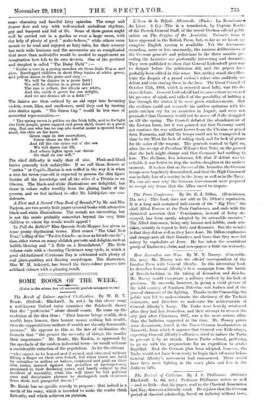L'Aveu rte la Male Allemande. (Paris : La Renaissance du
Liver. 5 fr.)—This is a translation, by Captain Koeltz of the French General Staff, of the recent German official publi- cation on The Origins cf the Armistice. Extracts from it have appeared in the British Press, but, so far as we know, no complete English version is available. Yet the documents recording, more or less summarily, the anxious deliberations of the German generals and politicians in the three months pre- ceding the Armistice are profoundly interesting and dranuitie. They were published to show that General Ludendorff gave way to despair before 'the politicians did, and the papers have probably been edited in this sense. But, as they stand, they illus- trate the despair of a proud nation's rulers who suddenly see defeat and ruin staring them in the face. The Great Council cf October 17th, 1918, which is reported most fully, was the de- cisive debate. General Ludendorff had to some extent recovered his presence of mind, and talked of the possibility of holding a line through the winter if he were given reinforcements. But the civilians could not reconcile his sudden optimism with his panic-stricken cry for an armistice. in August, and were not persuaded that Germany would not be worse off if she struggled on till the spring. The Council debated the abandonment of the Eastern front, but it was pointed out that Germany could ' not continue the war without horses from the Ukraine or petrol from Rumania, and that the troops could not be transported in time to the West for lack of rolling-stock and for lack of grease for the axles of the wagons. The generals wanted to fight on, after the receipt of President Wilson's first Note, on the ground that the luck might change and that Germany had nothing to lose. The civilians, less inhuman, felt that if defeat was in. evitable it was better to stop the useless slaughter at the earliest moment.. It is clear that on the eve of the Armistice the German troops were hopelessly demoralized, and that the High Command was in daily fear of a mutiny in the Army as well as in the Navy. We can see now why the German Government were prepared to accept any terms that the Allies cared to impose.










































 Previous page
Previous page